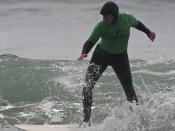Have you ever been trying to figure something out that you just can't piece together and then all of a sudden have it hit you? If you have, you've experienced the type of learning called insight learning.
The term insight refers to solving a problem through understanding the relationships various parts of a problem.
Wolfgang Kohler, a Gestalt psychologist who was born in 1887 and died in 1967, used chimpanzees in the study of insight learning. Kohler who was born in Revel, Estonia and moved to the United States in 1935, did pioneering studies in the behavior of apes that showed the importance of perceptual organization and insight in learning.
His groundbreaking experiment involved one of his chimpanzees, Sultan. Sultan had learned to use a stick to rake in bananas outside of his cage. This time Kohler placed the banana outside of the reach of just one stick and gave Sultan two sticks that could be fitted together to make a single pole that was long enough to reach the banana.
After fiddling with the sticks for an hour or so, Sultan happened to align the sticks and in a flash of sudden inspiration, fitted the two sticks together and pulled in the banana. Kohler was impressed by Sultan's rapid "perception of relationships" and used the term insight to describe it. He noted that such insights are not learned gradually through reinforced trials. They seemed to occur in a flash when the elements a problem are set up appropriately.
In another experiment boxes were put in a room with a banana hanging from the ceiling. The chimps found out that they could stack the boxes on top of one another to reach the banana without being taught to do it.
It was also found that rats made cognitive maps,


